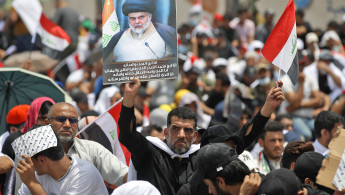Maliki leaks: Sadr calls on Maliki to quit politics, surrender to Iraqi judiciary
Shia cleric Muqtada al-Sadr, head of the Sadrist Movement, on Monday called on his rival Nouri al-Maliki, Iraq's former prime minister, to quit politics and surrender to the judiciary after secret recordings attributed to al-Maliki were released online.
Since last week, a series of leaked recordings attributed to Nouri al-Maliki was published on Twitter by Ali Fadhil, an Iraqi journalist living in the US. In the recordings, Maliki allegedly insults influential Shia cleric Muqtada al-Sadr and the Iraqi Popular Mobilisation Forces (PMF), describing both as "cowards".
The recordings outraged Sadr loyalists.
Fadhil, the journalist who published the recordings has vowed in an interview with Al-Araby Al-Jadeed, The New Arab's Arabic-language sister outlet, to release more in the coming days.
Sadr called on al-Maliki to abandon politics and "surrender" to the Iraqi judicial authorities. The political crises in Iraq may deepen and lead to instability if al-Maliki refuses Sadr's call.
Sadr wrote in a tweet on Monday that the recordings attributed to Maliki were authentic and that his life is in danger because of Maliki's threats. Sadr called on leaders and clans allied with Maliki to denounce the recordings "to shut the door on intra-Shia fighting."
— مقتدى السيد محمد الصدر (@Mu_AlSadr) July 18, 2022
Sadr did not rule out "a third party" were involved in furthering infighting among the Shia community.
"I advise him [al-Maliki] to abandon the political work or repent or surrender himself into the judiciary," said Sadr. "He has no right after these destructive thoughts to lead Iraq in any way, as that means destruction for Iraq and its people."
Early on Tuesday, Fadhil posted a fifth episode of Maliki's recordings on Twitter. In this recording, Maliki and other Iran-backed militia leaders emphasise on the need for "blood-shedding in Iraq with the consent and fatwas from the religious leaders." Maliki advises the attendees to work closely with Iran's Islamic Revolutionary Guard Corps (IRGC) and not with Iran's Ministry of Intelligence.
الجزء ال 5 من التسجيل المُسرب ل نوري المالكي:
— Ali Fadhil _ علي فاضل (@ali_alifadhil) July 18, 2022
يجب إراقة الدماء في العراق بموافقة مراجع وقيادات وبها شرعية!
الفتح والكتائب والعصائب وسيد الشهداء وبدر تابعين لإيران
قادة الحشد لايهمهم شىء غير المزارع والأموال وهم بعالم اخر
انصحكم بالذهاب مع الحرس الثوري لا مع الاطلاعات#انشر_المقطع pic.twitter.com/JpiTaOxvsd
Soon after, several Iraqi journalists and Iraqi Twitter users claimed that Maliki had fled to the Oman Sultanate but a well-informed source from the Iraqi political leaders in Baghdad, speaking on condition of anonymity to The New Arab, refuted these claims.
Last week, Maliki denied in a statement accusations related to the recording and said that were "fabricated" to create "chaos" among Iraq's Shia community.
A well-informed source from the Iraqi ruling elites and pro-Iran Shia groups told The New Arab on condition of anonymity that "the recordings are authentic and they are by Maliki."
🛑الصدر يؤكد صحة التسريبات التي نشرها علي فاضل
— سفيان السامرائي (@SufianSamarrai) July 18, 2022
ويستغرب أن المالكي المحسوب على أل الصدر يهدد بقتله
ويتوقع أن يقوم المالكي بهذه العملية كما تم إغتيال والده
ويطالب المالكي بتسليم نفسه للقضاء العراقي فورا والتنحي من العملية السياسية
وأخبار أخرى تسربت أن المالكي فر الى سلطنة عُمان https://t.co/7JI7ox0y2x
"The next stage is fighting (...) all to defend themselves, Sadr wants to kill and slaughter, I trust neither the Iraqi army nor police, and I told the Iraqi PM, Mustafa al-Kadhimi that I have no trust in his army and police. I don't trust the PMF either. They are now a heap of cowards," al-Maliki had allegedly said in the fourth recording.
"We need weapons. I will protect myself if others can not protect me. I can protect myself. I am working to arm 10 to 15 groups to be ready for the battle and the congested stage. Who knows, I may attack Najaf if Sadr attacked people or the Shia Marjaeya, because this man [al-Sadr] is vengeful, and wants blood, although he is a coward, he wants money and he has stolen the country," he added, according to the recording.
"The Iraqi judiciary and the general prosecution should open a wide investigation into the leaked recordings, summon Maliki- if they can- and form a technical committee to inspect the audio recordings," Ahmed Haqi, a member of the Iraqi Civil Movement, has told Al-Araby Al-Jadeed, The New Arab's Arabic-language sister outlet.
"Although all know that the recordings are authentic [by Maliki], the judiciary should not play the role of the spectator, since the issue includes threats to the country's security and urging to violence and fighting."
Sadr won most seats in the election and formed a triple alliance with the Iraqi Sunni political blocs and the (KDP), vowing a "national majority" government and signalling against pro-Iran Shia blocs. But frustrated in his efforts to fulfil his promise to his supporters, Sadr ordered lawmakers from his bloc to resign, in which all his 73 MPs did so on 12 June.
Al-Maliki became prime minister of Iraq in 2006. In a bid to disarm the Mahdi Army, a Shia militia loyal to Sadr launched an operation against them in 2007 and 2008. Eventually, Sadr asked his militiamen to lay down their arms.





 Follow the Middle East's top stories in English at The New Arab on Google News
Follow the Middle East's top stories in English at The New Arab on Google News


